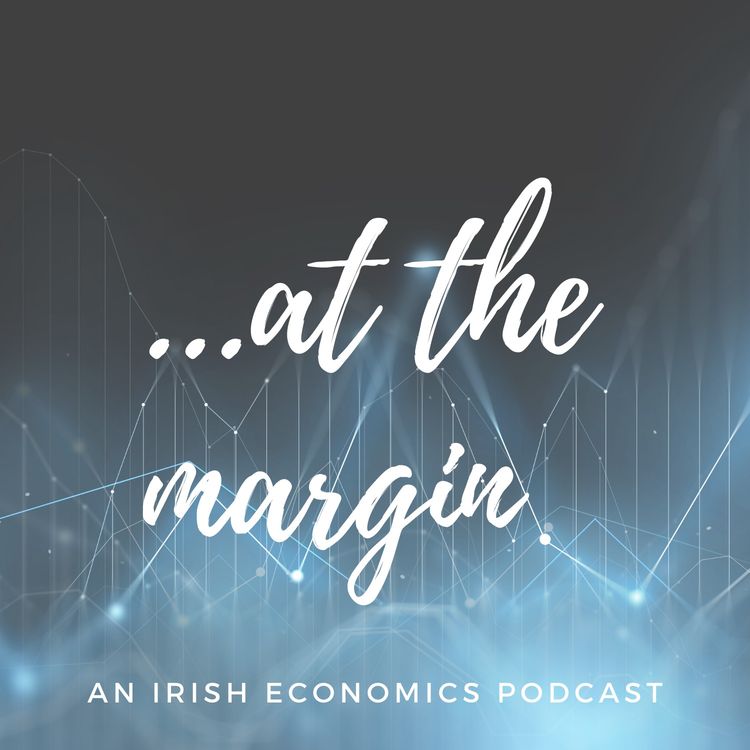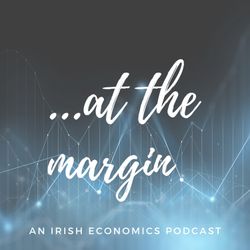Share

At The Margin
#44: Energy Poverty - Michelle Barrett & Dr. Barra Roantree (ESRI)
In this episode we discuss energy poverty and deprivation in Ireland with Barra Roantree and Michelle Barrett (ESRI). This is the first time I've had the opportunity to discuss research that I've been involved in (available here: https://www.esri.ie/publications/energy-poverty-and-deprivation-in-ireland)
We discuss the trends of energy poverty and deprivation from 1994-2016. Some households tend to respond to burdensome energy expenditures by cutting back while others are more likely to incur the additional cost while potentially cutting back on other expenditures. We discuss the groups that are more associated with either of these behaviours.
The second part of the report covers the recent energy price changes. We discuss the impacts across the income spectrum, and highlight the socioeconomic groups most affected.
Finally, we discuss ways in which the government could respond to shield those who are most vulnerable, discussing the equity (and efficiency) implications of proposed measures.
I hope you enjoy!
More episodes
View all episodes

4. #49: Gender Diversity in Irish Economics (ISWE Panel II)
48:43||Season 5, Ep. 4This is the final episode in conjunction with the Irish Society for Women in Economics (ISWE). This episode features a panel discussion on gender diversity in the Irish Economics Profession. I am joined by Dr. Margaret Samahita, Assistant Professor at UCD; Dr. Kevin Devereux, Assistant Professor at Peking University; and Míde Griffin, now based at the European University Institute in Florence but who was a research assistant with the ESRI at the time of recording. The conversation revolves around some research being carried out by Marageret and Kevin on gender diversity in Irish economics, with some additional insight offered by Míde. I hope you enjoy the conversation. The papers discussed can be found here: Are economics conferences gender-neutral? Evidence from Ireland: https://www.ucd.ie/economics/t4media/WP22_25.pdf Gender, Productivity, and Promotion in the Irish Economics Profession: https://www.ucd.ie/economics/t4media/WP22_16.pdf
3. #48: Environment and Wellbeing: Dr. Kate Laffan (LSE)
51:10||Season 5, Ep. 3This is the third episode in our special series in association with the Irish Society for Women in Economics (ISWE). I am joined by Kate Laffan to discuss the environment and wellbeing. Kate is an Assistant Professor in Behavioural Science at the London School of Economics. Prior to that, Kate was a Marie Curie Fellow at UCD. Kate has done much work on the environment and how it impacts our welfare and general wellbeing. This is a very interesting conversation that took place some time ago as we were emerging from lockdown, so hopefully none of the lockdown fatigue comes through! I hope you enjoy the discussion.
2. #47: Can onerous form-filling have economic consequences? Administrative Burdens - Lucie Martin (UCD)
46:58||Season 5, Ep. 2I am joined by Lucie Martin, PhD candidate at University College Dublin, to discuss administrative burdens. If I were to distil administrative burdens into a single sentence it would be the burden created by onerous form-filling or other administrative tasks. We all know the pain that comes with having to fill out yet another form or go through a seemingly unnecessary administrative process, but the research by Lucie and others suggests that this can create barriers for many to access certain benefits or services. Lucie takes us through the mechanisms of how this plays out. This is one of those great podcast topics. It is something that I was previously unaware of but when the concept was explained to me, I found it instantly relatable and wanted to find out more. I hope you share the same enthusiasm!
1. #46: Gender Wage Gap in Ireland - Dr. Karina Doorley (ESRI) & Prof. Donal O'Neill (Maynooth University)
43:19||Season 5, Ep. 1Welcome to a new set of episodes put together in conjunction with the Irish Society for Women in Economics (ISWE).In this first episode we discuss the gender wage gap in Ireland. I am joined by Karina Doorley of the ESRI and Donal O’Neill of Maynooth University. Both have looked at various aspects of the participation of women in the Irish workforce and also the differences in wages and earnings between men and women. Karina has charted the evolution of the gender pay gap in Ireland, while Donal and colleagues at Maynooth - Aedín Doris and Olive Sweetman - have explored the evolution of earnings after childbirth. We discuss these issues and more in this episode. If you enjoyed listening, please subscribe and tell your friends! Check out ISWE at the following address: https://www.iea.ie/irish-society-for-women-in-economics-iswe/
5. #45: Are Electricity Markets Fit For Purpose?
58:07||Season 4, Ep. 5Energy prices are on everyone's mind lately since the Ukranian conflict began. Electricity markets have come under fire at a European level with Ursula von der Leyen saying they are no longer fit for purpose. Presumably this comment is in reference to the fact that wholesale electricity markets operate by setting the price at the cost of the most expensive unit to generate at a given moment. This guides good decision making, but has the side effect of creating windfall profits in extraordinary times such as this. So the key question is - is there a way to reduce these windfall profits for firms, transfer those returns or economic rents to consumers, be it through a transfer or changes in prices? There are many options but all may interfere with the efficient operation of the market and create unintended consequences. One key point about electricity markets is that they are complicated and a good market brings on the right generation at the right time. This is really important for short-term efficiency but also in the long run. One example of a potential unintended consequence is in relation to decarbonisation - we need the right portfolio of wind and renewables, but also storage and flexible generation to operate when wind is idle. A good market will find the best mix for us, adjustments to the market must minimise the likelihood of interfering with this. So that's the problem facing European decision-makers right now. In this episode I am joined by Bram Claeys, Senior Advisor with the The Regulatory Assistance Project (RAP), which is an independent, global NGO advancing energy policy innovation. This group have reviewed the potential options to solve this energy market conundrum, and have put forward some proposals of their own which we will discuss.
2. #43: Health Economics & Healthcare Systems - Prof. Ciaran O'Neill (QUB)
52:03||Season 4, Ep. 2This episode is all about health economics, a topic which has been on my to-do list since I started the podcast. We give an introduction to health economics and discuss the type of healthcare problems economists can help with. We go through healthcare on the island of Ireland and compare the systems in place north and south and finally we discuss the future of healthcare on the island.On this episode we are talking to Professor Ciaran O Neill of Queen's University, Belfast. Ciaran is a professor at the School of Medicine, Dentistry and Biomedical Sciences at Queen's. Many of you may know Ciaran as co-organiser of the Ireland Masterclass in Health Economics. If you like this or other episodes, please share on social media or tell friends, family or colleagues. @AtTheMargin on Twitter
1. #42: Ukraine crisis & energy/environmental policy - Oxford panel discussion
33:35||Season 4, Ep. 1Today's episode features a roundtable discussion on the Ukranian conflict and what this means for energy and environmental policy in Europe. This roundtable discussion took place at a recent economics of sustainability workshop at the University of Oxford. We discussed a number of topics, including the short term policy response, the implications for the transition to renewables and agricultural policy.Among others, participants were drawn from: the University of Oxford, Technical University of Berlin, the University of Graz, Utrecht university, the University of Barcelona, and the London School of Economics. My thanks to all the workshop participants who offered their voices to the podcast. We covered a wide breadth of topics, some of which I may return to in future episodes to tackle in greater depth. Please do share with friends or on social media. All the best!
#41: Women in Economics - ISWE Panel
40:14|I am joined by members of the Irish Society for Women in Economics (ISWE) executive committee to discuss the topic of women in economics. Bróna ní Chobhthaigh, Oana Peia, Karen Arulsamy and Darragh Flannery join to form the panel. Among the topics covered, we discuss some of the barriers faced by women at various stages of the career and lifecycle and how these interact. Please check out the ISWE website where they will list many resources as the society develops. They also have accounts on the usual social media outlets: Email isweconomics@gmail.comTwitter @isweconomicsInstagram ISWEconomicsLinkedIn www.linkedin.com/groups/13988991/I hope you enjoy this discussion!